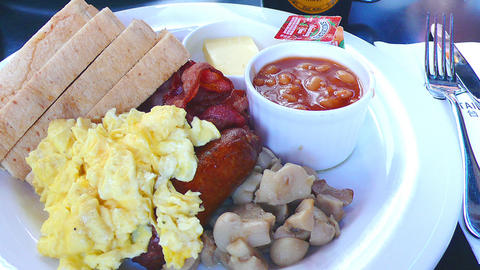Because of Carnegie's long-standing reputation as a dining and nightclub fixture among Western expats, it's easy to become cliche when reviewing it. Even those who have little experience of Taipei's nightlife know the place for its 30-plus crowd. What people seem to be less aware of, though, is Carnegie's brunch. It's a feature that deserves applause for its relaxing ambience, friendly prices and, of course, good food.
We, the reviewer and three cycling mates, reached the destination famished after a Sunday morning ride. We seated ourselves at an outdoor table on Anhe road, where there's little traffic. The weather was perfect: a gentle breeze and wintry sunshine. For a moment, we felt we had left pollution-plagued Taipei.
Though the brunch menu is limited, it comes from a reputed kitchen that earned a favorable review in the Taipei Times three years ago. One companion warned us against the big version of the traditional English breakfast (NT$480), simply because the proportions are too generous, even for the ravenous. So we went for the small version of the English plate (NT$320), eggs Benedict (NT$250) and the Continental (NT$260), all of which were larger than similar options served at other establishments.

PHOTO: HO YI, TAIPEI TIMES
The English breakfast consists of bacon, eggs, sausage, fried mushrooms, baked beans and toast and comes with a glass of orange juice and coffee or tea with refills. It was quite satisfying after a sweat-inducing workout. Departing from the traditional, Carnegie's eggs Benedict included hearty portions of smoked salmon, spinach and fried potatoes.
If you are more the do-it-yourself type, a variety of fillings are available to make your own omelet. Fruit salad with yogurt and honey are available for the health-conscious while pancakes with apple, raisin, banana and/or bacon topped with brown sugar and syrup sounds seductive.
The blues/rock tunes played on the day of our visit suited the lackadaisical Sunday atmosphere. The shadowed indoor seats, however, seemed much too somber for a brunch crowd.
Though the menu could be expanded with lighter options, the perennial nightspot may well make it into the top 10 list of the city's best brunch places.

June 9 to June 15 A photo of two men riding trendy high-wheel Penny-Farthing bicycles past a Qing Dynasty gate aptly captures the essence of Taipei in 1897 — a newly colonized city on the cusp of great change. The Japanese began making significant modifications to the cityscape in 1899, tearing down Qing-era structures, widening boulevards and installing Western-style infrastructure and buildings. The photographer, Minosuke Imamura, only spent a year in Taiwan as a cartographer for the governor-general’s office, but he left behind a treasure trove of 130 images showing life at the onset of Japanese rule, spanning July 1897 to

In an interview posted online by United Daily News (UDN) on May 26, current Chinese Nationalist Party (KMT) Chairman Eric Chu (朱立倫) was asked about Taichung Mayor Lu Shiow-yen (盧秀燕) replacing him as party chair. Though not yet officially running, by the customs of Taiwan politics, Lu has been signalling she is both running for party chair and to be the party’s 2028 presidential candidate. She told an international media outlet that she was considering a run. She also gave a speech in Keelung on national priorities and foreign affairs. For details, see the May 23 edition of this column,

The Taiwan People’s Party (TPP) on May 18 held a rally in Taichung to mark the anniversary of President William Lai’s (賴清德) inauguration on May 20. The title of the rally could be loosely translated to “May 18 recall fraudulent goods” (518退貨ㄌㄨㄚˋ!). Unlike in English, where the terms are the same, “recall” (退貨) in this context refers to product recalls due to damaged, defective or fraudulent merchandise, not the political recalls (罷免) currently dominating the headlines. I attended the rally to determine if the impression was correct that the TPP under party Chairman Huang Kuo-Chang (黃國昌) had little of a

At Computex 2025, Nvidia CEO Jensen Huang (黃仁勳) urged the government to subsidize AI. “All schools in Taiwan must integrate AI into their curricula,” he declared. A few months earlier, he said, “If I were a student today, I’d immediately start using tools like ChatGPT, Gemini Pro and Grok to learn, write and accelerate my thinking.” Huang sees the AI-bullet train leaving the station. And as one of its drivers, he’s worried about youth not getting on board — bad for their careers, and bad for his workforce. As a semiconductor supply-chain powerhouse and AI hub wannabe, Taiwan is seeing